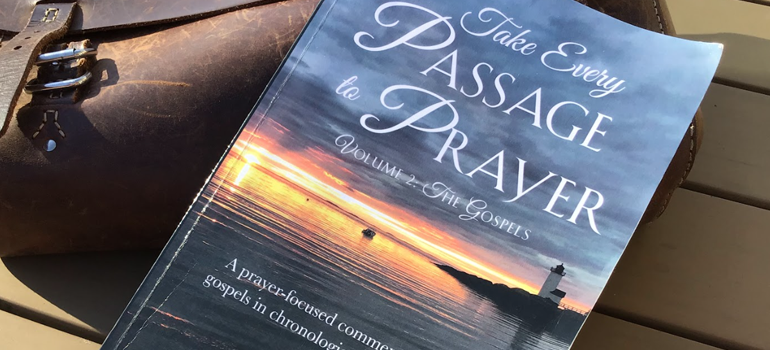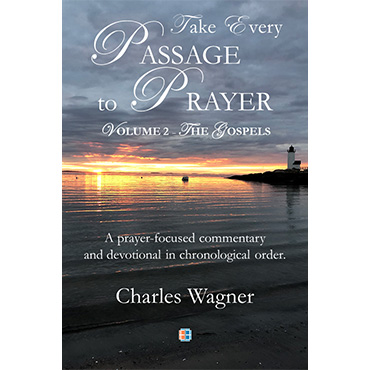The Gramazin Blog

Jesus Heals a Blind Man in Bethsaida
Take Every Passage to Prayer - Volume 2, The Gospels
Wednesday July 31, 2024
Mark 8:22-26
Father, help us to be prepared for the coming of Jesus. Help us to watch for Him to come into our hearts and minds even in the late of night. Help us to be prepared to go out and see Him while everyone else sleeps. Father, make us a people that begs You for the healing, not of ourselves, but of others. Help us to be faithful to pray for others day after day after day. Father, lead us into a solitary place where we are not distracted by the noise of daily living. Meet with us there. Teach us and guide us. Father, Jesus may heal us by methods we cannot understand. Give us hearts that are alright with that. He knows what is best. Father, after You have answered our prayer, help us to meditate on what You have done for us. Amen.
Father, Jesus, and his disciples, returned to Bethsaida. This is the general area where He had fed the 5,000. In this passage we read of no reference to crowds gathering around Him. Either the crowds have lost interest in Him, or Jesus has entered the town secretly, perhaps in the dark of night. I presume the latter.
I can imagine a man passing by Jesus and His disciples on the street late at night. He recognized Jesus. He may have followed Jesus to see where He went and then the man ran home to get a blind man and brought him to Jesus. Or he ran home quickly to bring a blind man to Jesus while Jesus was still walking on the street. In either case, a blind man was quickly brought to Jesus. The blind man’s friends begged Jesus to simply touch him so that he would regain his eyesight.
Father, we can learn a lesson from this for application in the 21st century. Who are we begging Jesus to heal? Who are we bringing before Jesus, pleading with Him to heal? Do we love someone who is suffering enough to fervently pray for them until Jesus heals? Or do we merely tell hurting people where they can find Jesus and send them on their way? Or do we ask Jesus half-heartedly to heal someone and then don’t bother to ask Him again? Father, this begging of Jesus for the healing of the blind man is a lesson about fervent, passionate, and determined prayer for others.
Once more, Jesus wants to avoid celebrity. He’s not interested in being fodder for the paparazzi. Instead, Jesus wants to have a private moment with the blind man. Father, Jesus wants a personal relationship with believers. We are not a mere face in a crowd or a number on a list to Him. Each one of us is fearfully and wonderfully made to walk, talk, glorify, serve, and relate with Jesus. He wants those private moments with us where it is just Him and us talking about Your glory, life in a fallen world, and ministry.
Why then do so many believers keep their distance from Him? Jesus is merely someone to connect with on Sunday or perhaps when a major crisis comes. They don’t walk and talk with Him every day. The only answer can be that such believers do not grasp the awesome blessing it is to have a personal relationship with the Son of God. He is not their priority – the world is.
Jesus grabbed the man’s hand and led him outside the village, most likely into a field away from the crowds. Father, Jesus is still doing that today in people’s lives. He is leading them away from the noise of the crowd and the noise of busy schedules to quiet places where they can be alone with Him. How does He grab us by the hand today to lead us into such places? Through trials and tribulations, disappointments, and suffering, wherein we finally hear His loving voice calling us to spend time with Him where we can find peace, joy, and rest.
The text tells us that Jesus spit on the man’s eyes. Why? Was there healing power in Jesus’ spittle? Perhaps. It could also be that the man’s eyelids had become sort of glued shut. Jesus’ spit, the only water available, was used to remove whatever was keeping the man’s eyelids stuck together. The text also tells us that Jesus put His hands on the man’s eyes after spitting on them.
“What do you see?” Jesus asked.
For the first time in a long time, the man could see something. However, what he saw was not clear. The people looked like trees walking around.
Jesus placed His hands on the man again. His eyes opened and his eyesight was completely restored. The text tells us that he saw everything (that includes the small details) clearly. He had 20/20 vision.
Father, we learn from the healing of this blind man that You sometimes do heal some, if not many, people by process. You heal us in step A. You then heal us in step B. You then heal us in step C. In between each step, You ask us what do we see? Do we see the small healing that has taken place? Are we looking for it? You then heal us in the next step. Once more You ask us what we see. Do we see this next small healing that has taken place? Are we noticing what You do in the small acts of healing?
The man had to be grateful for what Jesus had done. He was eager to celebrate with friends and family. His friends with him were probably also eager to wake up the whole village and tell them about what had happened. The desire to party was so strong that Jesus had to instruct the man not to go into the village to celebrate. He told the man to go home where the man could contemplate and meditate on what You had just done for him.
Father, do we believers take the time to meditate on what You have done for us? Do we reflect upon the goodness of Your character that generously and mercifully heals us? Or, do we forget about You after we enjoy answered prayer and get caught up in chatting about it with friends and family? Father, there are spiritual lessons in every answered prayer. When we are the recipient of an answered prayer, we must spend time alone with You and in Your Word. Answers to prayer are teachable moments for us, but only if we are silent and still to listen to Your voice. Amen.
We can conclude that this blind man wasn’t always blind. As his eyes began to recover after Jesus had touched them, he said that people looked like trees. How did he know what trees looked like? He had seen them before. This man had lost his eyesight. It was not a birth defect. Possible causes of lost eyesight include injury, diabetes, macular degeneration, cataracts, and glaucoma.
What? Jesus spit into the man’s eyes? Eww! That’s gross. I believe there is a lesson here for all believers. Jesus often does not do things the way we think He should do them. He often does not answer prayers the way we want Him to. In fact, Jesus might answer our prayers in a way that we find offensive to us. For example, a woman asks Jesus to give her courage. The woman is then diagnosed with breast cancer. That is offensive to many. How could He do that to her? The truth is that the woman will display courage in her battle against cancer that will be a testimony to others. Jesus often answers our prayers in ways we would never choose for ourselves. However, His ways are what heal us.
The disciples and the man’s friends were most likely present in the field as well. They are the people of whom the blind man described as looking like trees.
The author suggests the blind man’s description of the people looking like trees indicates that this healing was after dark. It may have been true that in the middle of the day that the people might have looked like people to the now partially blind man. However, in the dark of the night, where the bright light of day has yet to stimulate the man’s eyesight, both the trunks of trees and the people standing or walking about would appear in silhouette.
It is likely that the man going home and not into town to celebrate afforded Jesus and His disciples the opportunity to quietly walk out of Bethsaida without being further noticed. It makes one think – who was looking for Jesus to come into this town? Had people been looking for Him, they might have come to see Him. However, they weren’t looking for Him. Jesus came and left without the rest of the people encountering the Son of God within their village. Compare the people of Bethsaida with the Parable of the Ten Virgins in Matthew 25:1-13.







